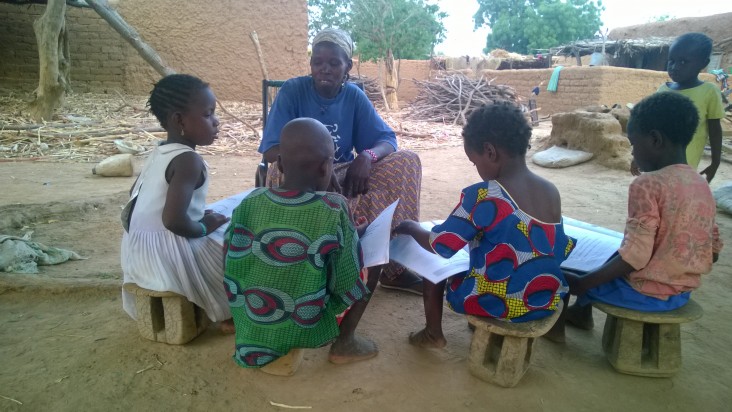Speeches Shim

April 2018 — Parents in the Dongoni village of southern Mali had no contact with their community school and were not aware of the importance of following up on their children’s progress. Attendance and achievement were both low, particularly for girls, who were often occupied with household tasks.
But with the arrival of USAID’s Selective Integrated Reading Activity (SIRA) in 2016, things are changing. Village parents are now following up with their children to make sure they are doing their homework and that girls are released from household tasks so they can fully focus on their education.
During a community meeting, families gave authority to the village mothers’ association to monitor school attendance. The association received training from the USAID project on the use of school report cards and how to support children’s learning at home. Once parents are trained to support their children, community volunteers pay regular home visits to the families to provide additional support. Student attendance has improved at both school and libraries.
“We have noticed that our students are regular at school. Thanks to this project, they no longer skip classes,” explains Djibril Diallo, the Dongoni school director.
The project conducts awareness-raising sessions using materials like family-school liaison booklets and posters promoting early-grade learning, and organizes discussions with the communities. And to help children cultivate a love of reading, the project has provided community libraries with books at different text levels that young children can borrow to improve their reading and writing skills.
The SIRA project works with communities in Koulikoro, Segou and Sikasso regions to help parents improve student reading and writing in early grades. So far, over 7,000 first and second grade teachers and nearly 4,000 school directors have been trained in project strategies and techniques.
For example, as part of the classroom news strategy, students tell about their recent experiences and then help to translate the stories into written words by telling the teacher how to spell out sentences as they are written on a board. The teacher then uses the text to conduct letter and sound recognition exercises. Other techniques include guided reading, where the teacher reads a story to students to develop their comprehension and ability to predict, and guided writing, where the teacher guides students through four phases: pre-writing, first drafts, revision and final publication.
The project has also conducted one-day training sessions for parents and members of community-based organizations in more than 1,100 school communities with nearly 69,000 participants, 29 percent of whom were women. A family-school link booklet was developed for parents to use at home with their children; they later share results with teachers. If the parents are illiterate, they are encouraged to find a relative or neighbor to work with their children.
In addition, the project has trained and placed nearly 300 community facilitators in host communities. The facilitators commit to living in their host town/village for one year and work with an average of five school communities. They not only train parents and work with community-based organizations, but they also organize educational games and activities outside of school for children and train local volunteers, who will continue the activities once the facilitors’ year of service has ended.
Parental involvement and interest in their children’s learning has proved highly motivating for students, who are already showing improvement in mastering the sounds and letters of the alphabet, which are the building blocks of learning to read.
The project, which runs from 2016 to 2021, aims to train more than 12,000 first and second grade teachers and school directors and to benefit over 300,000 children.
LINKS
Follow @USAIDMali, on Facebook

Comment
Make a general inquiry or suggest an improvement.